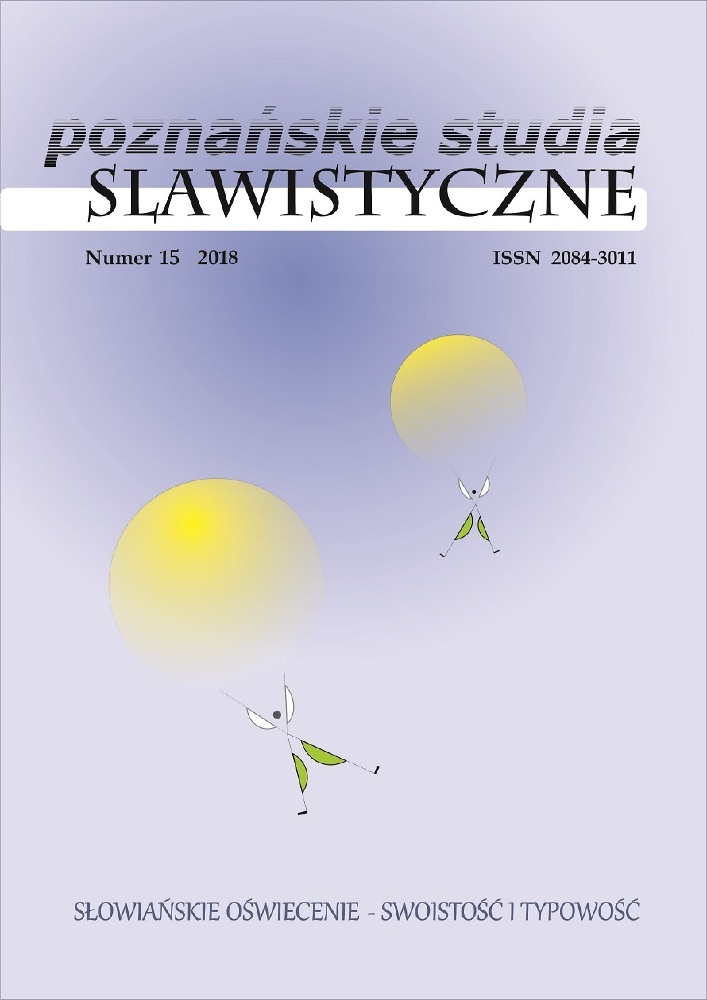Abstract
The intensity of the literary movement that took place in the Slovak territory integrated within the Kingdom of Hungary due to the Enlightenment policy of the ruler Joseph II can be properly illustrated by the genre-varied works of Ladislav Bartholomeides, an Evangelical priest and teacher. His first literary work Rozmlouvání Jozefa Druhého s Matějem Prvním Korvínus řečeným v království zemřelých, 1790 (The Conversation of Joseph II with Matthias I, Called Corvinus in the Kingdom of the Dead, 1790) is, in the first place, a significant evidence of the impact of the antique dialogue on the Slovak literary works. Bartholomeides updates the conversation of the dead, a popular genre form of the Enlightenment literature. Based on his predecessors’ assertions, he shapes the image of Joseph II as a clever and kind-hearted ruler. The Hungarian monarchs that Joseph II meets after his death defend his Enlightenment reforms. A critical reflection can be heard from Joseph’s lips. In terms of the contemporary Enlightenment writing, Bartholomeides put emphasis on the aesthetic category of “ingenuity”. In his attempt at an objectified interpretation of Joseph II’s political actions, he appeals also to his compatriots’ national sentiments. By the fact that the relationship of the Hungarian rulers with the Slavic ethnicity and its language is positive, he indirectly encourages them to cultivate their mother tongue. He gives the conversation also distinctive religious characteristics, he points out the connection between the earthly and the eternal life, since it is only immortality that gives purpose to the ruler’s earthly journey.References
Fontenelle, B. de (1683). Dialogues des Morts. Paris: Blageart.
Kniha Jozefowa. Sepsaná od gistého spatřugjcýho osmnácté stoletj. Djlem již stalé wěcy, a djlem proroctwj. Na způsob Biblj. Wydaná od M. W. Kraméryusa. W Praze: u Rosenmüllerských, za Jana Beránka Faktora, 1784.
Literatura slovenská jest potřebná, a slouží k rozšíření známosti řeči německé. In: Staré noviny literního umění. V B. Bystrici: vytištěné u Jana Jozefa Tumlera 1785/1786, s. 120–131.
Presspůrské Nowiny, 1. 7. 1783.
Rozmlauwánj Josefa Druhého s Matěgem Prwnjm Korwýnus řečeným, w králowstvj zemřelých při přjtomnosti některých gjných Uherských králů držané. W Praze, wytisstěné Roku 1789.
Beutel, A. (2006). Aufklärung in Deutschland. Göttingen: Vandenhoeck & Ruprecht.
Brtáňová, E. (2012). Pojmoslovie historie litterarie v reflexii regionálnych monografií Ladislava Bartolomeidesa. In: Na margo staršej literatúry. Zo žánrovej problematiky 11.–18. storočia. Bratislava: Kalligram – Ústav slovenskej literatúry SAV.
Constantin von Wurzbach. In: J. Richter, (1847). Biographisches Lexikon des Kaiserthums Oesterreich. 26. Theil. Wien : Kaiserlich-königliche Hof- und Staatsdruckerei, 1874, s. 57–62.
Greif, S. (2013). Literatur der Aufklärung. Paderborn: Wilhelm Fink Verlag.
Hurban, J.M. (1847). Slovensko a jeho život literárny. In: Slovenské pohľady, diel 1., zv. 2.
Mrva, I. (2018). Mária Terézia, vladárka a matka. Bratislava: Perfekt.
Münz, T. (1961). Filozofia slovenského osvietenstva. Bratislava: Vydavateľstvo SAV.
Považan, J. (1990). Bernolák a Bernolákovci. Martin: Vydavateľstvo Osveta.
Reinalter, H. (2008). Josephinismus als Aufgeklärter Absolutismus. Wien: Böhlau.
Richter, J. (1787). Warum wird Kaiser Joseph von seinem Volke nicht geliebt? Wien: Im Verlag Georg Philipp Wucherer.
Rosenstrauch-Königsberg, E. (ed.). (1988). Literatur der Aufklärung 1765–1800. 1. Aufl. Berlin: Volk und Welt.
Šmatlák, S. (1999). Dejiny slovenskej literatúry II. (19. storočie a prvá polovica 20. storočia). Bratislava: Národné literárne centrum.
Staré noviny literního umění. V B. Bystrici: vytištěné u Jana Jozefa Tumlera 1785/1786.
Urválková, Z. (2017). Dialogy Lúkiána zo Samosaty v souřadnicích českého literárního klasicismu. In: D. Tureček, P., Zajac, a kol., Český a slovenský literární klasicismus. Synopticko-pulzační model kulturního jevu. Brno: Host, s. 272–301.
Wurzbach C. von (1874). Richter, Joseph. In: Biographisches Lexikon des Kaiserthums Oesterreich. 26. Theil. Wien: Kaiserlich-königliche Hof-und Staatsdruckerei.
Zeyringer, K., Gollner, H. (2012). Eine Literaturgeschichte: Österreich seit 1650. Innsbruck: Stidienverlag.
License
Copyright (c) 2018 Erika Brtáňová

This work is licensed under a Creative Commons Attribution-NoDerivatives 4.0 International License.

